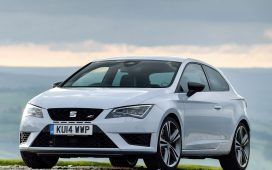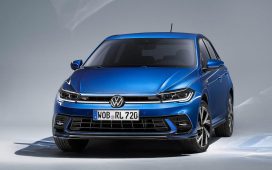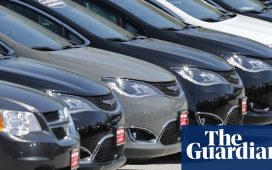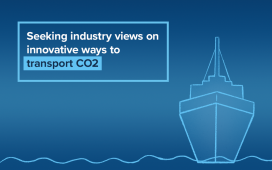Thirteen million diesel cars producing “extreme” levels of toxic air pollution are still on the roads in Europe and the UK, according to a report, seven years after the Dieselgate scandal first exploded.
The non-profit research group, the International Council on Clean Transportation (ICCT), revealed in 2015 that many diesel cars were highly polluting, emitting far more nitrogen oxides on the road than in official testing. The scandal led to a more rigorous test being introduced in the EU in 2019.
However, based on extensive testing evidence, the ICCT has now revealed that about 13m highly polluting diesel vehicles sold from 2009 to 2019 remain on the roads. A further 6m diesels have “suspicious” levels of emissions, the ICCT said. The cars span 200 different models produced by all the major manufacturers.
The ICCT said the bestselling models from 2009-2019 in the EU27 and UK with “extreme” emissions are Euro 5 versions of the VW Passat and Tiguan, Renault Clio, Ford Focus and Nissan Qashqai.
The test data analysed included official government testing, independent measurements using equipment attached to exhausts and roadside measurements of the real-world emissions of vehicles as drivers passed by. The latter, comprising 700,000 measurements in five European countries, showed that about 75% of diesel engine types exceed the “extreme” threshold.
The EU has set increasingly strict limits for exhaust emissions over the last three decades, with manufacturers meeting these by adding new technologies to all vehicles. The ICCT claim it is “almost certain” that cars with “extreme” emissions were using a defeat device, a piece of software that alters or deactivates the vehicle’s emissions technologies under certain conditions.
Rulings by the court of justice of the European Union (CJEU) since 2020 have clarified what constitutes an illegal defeat device, and the testing data, plus documents submitted by some manufacturers to governments, suggest many models still have these.
Environmental law charity ClientEarth and other groups have used the new ICCT evidence to send legal complaints to the UK, French and German governments, saying they have failed to tackle an apparent “epidemic” of defeat devices as the law requires them to do. Both the ICCT and ClientEarth said the proportion of highly polluting vehicles that have been recalled is small and that there is no transparency over whether repairs are effective.
Air pollution continues to be the biggest environmental health hazard in Europe, according to the European Environment Agency. Nitrogen dioxide emissions, largely produced by diesel vehicles, have been estimated to result in 64,000 early deaths every year.
“Over seven years have passed since the Dieselgate scandal first broke,” said Michelle Meyer, at the ICCT. “Yet, due to limited corrective action, these vehicles continue to operate across Europe today, harming the health of all who are exposed to the air pollution these emissions create.”
“[Dieselgate] is not over yet,” said Tim Dallmann, also at the ICCT. “There is a very strong base of evidence for taking action, and it’s up to the governments and other stakeholders. [Without action], it’s going to continue to fester. These are vehicles sold as recently as 2019, so they’re going to continue to be operating on the streets of European and UK cities for many years to come.”
The ClientEarth lawyer Katie Nield said: “It’s astounding to see that so little has changed [since 2015]. We’re sending legal complaints to three national governments to demand that the dirty legacy of Dieselgate is addressed once and for all. This was a betrayal of consumer and public trust and authorities cannot continue to let auto manufacturers off the hook.”
A spokesperson for the European Automobile Manufacturers’ Association said: “Court rulings and more recent European Commission guidance have shown all parties how important it is to have well written, clear legislation – particularly in this case, as emissions control is so complex. Previous Euro steps for cars and vans unfortunately did not deliver sufficient clarity. We note that the ICCT report acknowledges that official government reports did not conclusively identify any vehicles employing defeat devices.”
A spokesperson for Volkswagen said: “All Volkswagens comply with the legal limits of the emission standards that applied at the time of their initial registration. None of the Volkswagen vehicles mentioned contain an inadmissible defeat device.”
A spokesperson for Nissan said: “Nissan is committed to complying with applicable emissions requirements in all markets. Emissions standards and vehicle testing regimes have evolved considerably in recent years and continue to do so.”
after newsletter promotion
The ICCT report uses thresholds comparing real-world emissions with official test results to define “extreme” and “suspicious” levels of emissions. These largely align with those used by the EU’s Joint Research Centre. The researchers said the estimates of 13m cars with “extreme” emissions and 6 million with “suspicious” emissions are conservative, as they are based on official government testing data. Other data showed there were further highly polluting models not included in government tests.
Cars producing “extreme” emissions, which can be several times higher than official emissions levels, are “almost certain” to use a defeat device, said Dalmann. “We don’t see any other plausible explanations.”
Rulings by the CJEU in 2020 and 2022 made it clear that all defeat devices that reduce emissions controls through most of the year during normal driving conditions are illegal. The rulings apply retrospectively to vehicles that are already on the road.
UK and EU law mandates that governments must investigate cases of potential defeat devices and require manufacturers to take corrective action if a prohibited defeat device is found. The CJEU ruling from 2020 still applies in the UK as retained EU law, the ICCT said.
“Some emissions-related recalls have been reported in the UK, France and Germany,” said Nield. “But publicly available information suggests these could cover only a fraction of the millions of excessively polluting vehicles that remain on our roads.”
In many cases, auto manufacturers in Europe have not been punished or held to account to deliver effective solutions, ClientEarth said. Instead, individual consumers have been left to seek financial compensation through class action lawsuits.
In contrast, in the US, Volkswagen was forced to buy back vehicles or offer effective emissions fixes and also paid almost $3bn (£2.45bn) into a fund to help US states cut pollution from road transport. ClientEarth called for a similar clean-up fund to be created in Europe.
Renault and Ford did not respond to requests for comment.
A DfT spokesperson said: “This government is committed to decarbonising transport, investing £2bn into electric vehicles, ending the sale of petrol and diesel cars and vans by 2030 – with all new cars and vans being zero emission at the tailpipe by 2035.
“Abuse of the system is not acceptable and since 2016, we have massively increased oversight of emissions tests and established a specialised unit to test vehicles in the real world, as well as in labs, and investigate suspicious practice – and are looking to bring forward stronger powers.”









